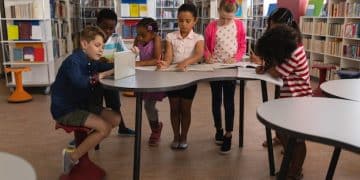Kindergarten Readiness in 2025: Impact of Early Childhood Education Expansion

Kindergarten readiness in US schools by 2025 will likely be significantly impacted by the expansion of early childhood education programs, potentially leading to improved academic and social-emotional skills among incoming students.
As the US education system evolves, the expansion of early childhood education programs is poised to reshape kindergarten readiness. The question is: How Will the Expansion of Early Childhood Education Programs Impact Kindergarten Readiness in US Schools by 2025?
Understanding the Landscape of Early Childhood Education in the US
Early childhood education in the United States is a diverse and evolving field. It encompasses a range of programs designed to support children’s development from infancy through age five. These programs play a crucial role in preparing children for kindergarten and beyond. Let’s delve into the details of the current scenario of early childhood education in the US.
Current State of Early Childhood Education
Currently, early childhood education programs vary significantly in terms of funding, quality, and accessibility across different states. Some states have made substantial investments in universal preschool programs, while others lag behind. Understanding these disparities is essential for predicting the impact of future expansions.
Key Players in Early Childhood Education
Several key players contribute to the landscape of early childhood education. These include federal agencies, state governments, local school districts, non-profit organizations, and private providers. Each entity has its own priorities and approaches, which can influence the overall effectiveness of early childhood education initiatives.
- Federal funding and initiatives provide critical support.
- State-level policies shape program implementation and standards.
- Local districts tailor programs to meet community needs.
- Non-profits advocate for quality and accessibility.

In conclusion, early childhood education in the US is a complex system with numerous stakeholders. The expansion of these programs could lead to substantial improvements in kindergarten readiness, provided that funding is adequate and programs are well-designed.
The Concept of Kindergarten Readiness Defined
Kindergarten readiness is a multifaceted concept that goes beyond basic academic skills. It encompasses a range of cognitive, social-emotional, and physical abilities that enable children to thrive in a kindergarten setting. Let’s explore the key components of kindergarten readiness and why they matter.
Academic Skills
Academic skills are an important aspect of kindergarten readiness, including basic knowledge of letters, numbers, and shapes. Children who enter kindergarten with a foundation in these areas are better prepared to engage with the curriculum and keep pace with their peers.
Social-Emotional Development
Social-emotional development is equally critical. Children who can manage their emotions, follow directions, and interact positively with others are more likely to succeed in kindergarten. These skills support their ability to build relationships, participate in group activities, and navigate the classroom environment.
Ensuring kindergarten readiness involves:
- Assessing children’s cognitive abilities.
- Evaluating their social and emotional skills.
- Providing support to address developmental gaps.
Ultimately, kindergarten readiness means equipping children with the skills and confidence they need to succeed in their early academic years. A holistic approach that emphasizes both academic and social-emotional development is most effective.
Potential Benefits of Expanding Early Childhood Education Programs
Expanding early childhood education programs could yield numerous benefits for children, families, and society as a whole. These programs can provide a strong foundation for future academic success, reduce achievement gaps, and promote long-term economic growth. Here’s a look at some of the potential benefits.
Improved Academic Outcomes
Children who participate in high-quality early childhood education programs often demonstrate better academic outcomes in elementary school and beyond. They tend to score higher on standardized tests, have better grades, and are less likely to require special education services.
Reduced Achievement Gaps
Early childhood education can help reduce achievement gaps between children from different socioeconomic backgrounds. By providing all children with access to high-quality learning experiences, these programs can level the playing field and give every child a chance to succeed.

Long-Term Economic Benefits
Early childhood education programs can also generate long-term economic benefits for society. Studies have shown that individuals who participate in these programs are more likely to graduate from high school, attend college, and secure stable employment. This leads to increased tax revenues and reduced reliance on public assistance programs.
Other benefits include:
- Enhanced social and emotional skills.
- Increased parental involvement in education.
- Stronger community connections.
In summary, expanding early childhood education programs has the potential to transform the lives of children and create a more equitable and prosperous society. Investing in early childhood education is an investment in our future.
Challenges and Considerations for Successful Expansion
While the expansion of early childhood education programs holds great promise, it also presents several challenges and considerations. Ensuring that these programs are high-quality, accessible, and sustainable requires careful planning and attention to detail. Let’s contemplate some of the challenges.
Ensuring Program Quality
Program quality is paramount. High-quality early childhood education programs are characterized by well-trained teachers, developmentally appropriate curricula, and supportive learning environments. Maintaining these standards as programs expand can be difficult, but it is essential for achieving positive outcomes.
Addressing Accessibility Issues
Accessibility is another key consideration. Many families, particularly those from low-income backgrounds, face barriers to accessing early childhood education programs. These barriers may include high tuition costs, transportation difficulties, and a lack of available slots. Strategies to address these issues are needed to ensure that all children have the opportunity to participate.
Funding and Sustainability
Sustainable funding models are essential for long-term success. Expanding early childhood education programs requires a significant investment of public resources. Policymakers must develop funding strategies that are both adequate and sustainable to support these programs over time.
Important considerations include:
- Teacher training and professional development.
- Curriculum development and alignment with kindergarten standards.
- Parental engagement and family support services.
Successfully expanding early childhood education programs requires a comprehensive approach that addresses issues of quality, accessibility, and sustainability. By carefully considering these challenges and implementing effective solutions, we can maximize the benefits of early childhood education for all children.
Potential Impact on Kindergarten Classrooms by 2025
By 2025, the expansion of early childhood education programs could have a significant impact on kindergarten classrooms across the US. These changes will affect the skill levels of incoming students, the demands placed on kindergarten teachers, and the overall classroom environment. Here’s how classrooms may evolve.
Higher Skill Levels of Incoming Students
With more children entering kindergarten having participated in early childhood education programs, we can expect to see higher skill levels among incoming students. This could mean that kindergarten teachers will be able to cover more material and move at a faster pace.
Increased Demands on Teachers
At the same time, kindergarten teachers may face increased demands as they work to meet the needs of a more diverse student population. Some students may still arrive unprepared for kindergarten, requiring individualized support and intervention.
Changes in Classroom Environment
The overall classroom environment is also likely to change. With more students who have experience in structured learning environments, kindergarten classrooms may become more collaborative and engaging. Teachers may be able to incorporate more project-based learning and other innovative teaching strategies.
Expected changes include:
- More collaborative learning environments.
- Increased parental involvement in the classroom.
- Greater emphasis on social-emotional learning.
Expanding early childhood education programs has the potential to transform kindergarten classrooms and improve outcomes for all students. By preparing children for success from an early age, we can create a brighter future for our nation.
Policy Recommendations for Maximizing Kindergarten Readiness
To maximize the impact of expanded early childhood education programs on kindergarten readiness, policymakers should consider several key recommendations. These recommendations focus on ensuring program quality, promoting accessibility, and fostering collaboration between early childhood education providers and kindergarten teachers. Let’s dive into these recommendations.
Invest in Teacher Training and Professional Development
High-quality teachers are the cornerstone of effective early childhood education programs. Policymakers should invest in comprehensive teacher training and professional development opportunities to ensure that teachers have the skills and knowledge they need to support children’s learning and development.
Expand Access to Early Childhood Education Programs
Expanding access to early childhood education programs is essential for reducing achievement gaps and promoting social equity. Policymakers should work to eliminate barriers to access, such as high tuition costs and transportation difficulties, and ensure that all children have the opportunity to participate.
Foster Collaboration Between Providers and Teachers
Collaboration between early childhood education providers and kindergarten teachers can help ensure a smooth transition for children as they move from preschool to kindergarten. Policymakers should encourage these partnerships and provide opportunities for teachers and providers to share best practices and align curricula.
Recommendations include:
- Establishing clear standards for early childhood education programs.
- Providing funding incentives for high-quality programs.
- Engaging parents and families in the education process.
By implementing these policy recommendations, we can create a comprehensive system of early childhood education that prepares all children for success in kindergarten and beyond. These efforts will pay dividends in the form of improved academic outcomes, reduced achievement gaps, and a stronger workforce.
| Key Aspect | Brief Description |
|---|---|
| 🏫 Early Education Expansion | More access to preschool programs for children. |
| 📚 Kindergarten Readiness | Children start kindergarten with basic skills. |
| 📈 Academic Outcomes | Improved test scores and academic performance. |
| 🌱 Social Skills | Better social interaction and emotional development. |
Frequently Asked Questions
▼
Early childhood education includes programs and activities for children from infancy through age five. It aims to foster cognitive, social, and emotional development before formal schooling begins.
▼
Kindergarten readiness ensures children start school with the necessary skills for academic and social success. This includes basic literacy, numeracy, and the ability to follow instructions.
▼
Expanded programs can lead to more prepared students, allowing teachers to focus on advanced topics. Classrooms may become more collaborative and interactive with students ready to engage.
▼
Challenges include ensuring high-quality programs, addressing funding needs, and providing necessary teacher training. Maintaining equal access for all children requires careful planning.
▼
Policies include investing in teacher development, expanding program access, and fostering collaboration between preschools and kindergartens. Family engagement is also crucial for success.
Conclusion
In conclusion, the expansion of early childhood education programs holds significant promise for enhancing kindergarten readiness in US schools by 2025. By addressing the challenges and implementing effective policies, we can ensure that more children enter kindergarten with the skills and knowledge they need to succeed, setting the stage for future academic and personal accomplishments.





